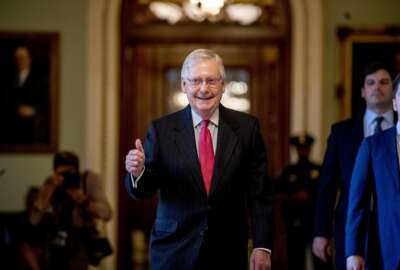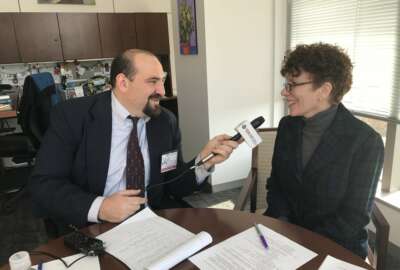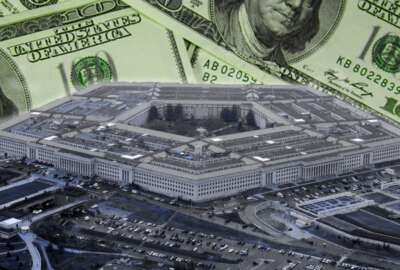
Military cases of coronavirus now higher than the civilian rate
In today's Federal Newscast, the Defense Department saw cases in the services more than double since Monday.
To listen to the Federal Newscast on your phone or mobile device, subscribe in PodcastOne or Apple Podcasts. The best listening experience on desktop can be found using Chrome, Firefox or Safari.
- The military is seeing a spike in coronavirus cases. Military cases of coronavirus are now higher than the civilian rate. The Defense Department saw cases in the services more than double since Monday. At last count, the Pentagon had 600 defense-related cases. 280 of those are service members.134 are civilians, 98 are military dependents and 62 are contractors. Only 27 of the total cases have led to hospitalization. One contractor died earlier this week after being infected.
- The $2 trillion stimulus package passed by the Senate includes some relief for federal retirees. It allows retirees to withdraw up to $100,000 from their retirement accounts without incurring the usual tax penalty. Retirees have to pay the money back within three years. The waiver also applies to people who are diagnosed with the coronavirus or out of work. (Federal News Network)
- The Senate’s coronavirus stimulus bill sets watchdogs to oversee a $2 trillion pot of money. The bill would have the president nominate and the Senate confirm a Special Inspector General for Pandemic Recovery. That IG would oversee a $500 billion stabilization fund to support airlines and other industries. It would also stand up a Pandemic Response Accountability Committee to audit and investigate claims of fraud, waste and abuse of coronavirus spending. The Senate would also give the Government Accountability Office another $20 million to oversee this spending. (Federal News Network)
- The bill also sets aside $10.5 billion for the Defense Department. More than four billion dollars of the money would go to providing health care to service members and their families, buying medical equipment and expanding the capacity of hospitals. $1.5 billion will go to the National Guard for emergency deployments. More than four hundred million dollars will go toward developing a vaccine and anti-viral medications for COVID-19. That money also keeps DoD labs open 24/7 and pays for diagnostic testing. (Federal News Network)
- The Defense Department’s premiere medical school is awarding degrees to hundreds of students a month-and-a-half ahead of their normal graduation date. 150 new doctors and 33 advanced practice nurses will graduate from the Uniformed Services University of the Health Sciences on April 1. USU leaders say they made the decision because the students are ready, and they’re needed to help DoD fight the coronavirus pandemic. Another 26 nurse anesthesia students will graduate on May 1. (Uniformed Services University)
- The Government Accountability Office is out with its own evaluation of the military’s privatized housing program, and the results aren’t pretty. By and large, the report identifies oversight gaps DoD leaders have already acknowledged. Specifically, GAO found that the data the military collects from housing companies doesn’t deliver meaningful information on actual housing conditions. Defense personnel do conduct some in-person inspections, but only on a tiny sample of homes. Auditors also found widespread “anomalies” in the data that housing companies report to the military services. (Government Accountability Office)
- Agencies aren’t entirely off their paper diet. The Government Publishing Office sent out more than three million federal publications during the agency’s first week of being on emergency status due to the pandemic. GPO provided citizens with publications from the Census Bureau, the Transportation Security Administration, the Consumer Product Safety Commission and many other agencies. About half of all the publications distributed were from the 2020 census. GPO also continues to publish the Congressional Record, Congressional calendars and other legislative documents when Congress is in session.
- The Environmental Protection Agency pulls back on enforcement activities because of the pandemic. Calling the policy temporary, Administrator Andrew Wheeler says the agency expects regulated businesses to maintain their compliance with environmental regulations to return to compliance after the emergency. The policy requires entities to document and report non-compliance that might occur. But EPA says it won’t seek penalties for violations or lapses in routine monitoring, sampling, testing or lab analysis of water and air. The relaxed policy doesn’t apply to Superfund site cleanup. (Environmental Protection Agency)
- Ramping up IT modernization efforts at one agency paid off during the pandemic emergency. The National Science Foundation rolled out two technology tools more quickly than planned to ensure employees could telework more efficiently. Dorothy Aronson, the NSF CIO, says the week before agency leaders decided all employees should work remotely, her staff implemented the Zoom video teleconferencing application and Microsoft TEAMS collaboration tool across the department. She says her staff completed the project well ahead of schedule. Those tools along with a few other tweaks to the network and VPN are letting employees take full advantage of all of NSF’s technology options. (Federal News Network)
- The IRS looks to make more of its services available online as part of its six-year business modernization plan. But it needs to make sure they’re safe from hackers. The Treasury Inspector General for Tax Administration says of the 63 applications taxpayers can access online, only 13% of them have gone through all five steps of the National Institute of Standards and Technology’s digital identity risk assessment. The Treasury Inspector General for Tax Administration recommends the IRS chief information officer take steps to speed up assessments of the remaining applications.
- Should union officials be allowed to use official time to lobby Congress? The Federal Labor Relations Authority The solicitation came at the request of the National Right to Work Legal Defense Foundation, which says Congress never authorized the use of appropriated funds for lobbying activities. And therefore, the 40-year-old labor-management relations statute doesn’t allow unions to use official time for interacting with Congress. FLRA will solicit public comments through April 24. The National Right to Work Foundation lobbies against some union activities.
Copyright © 2025 Federal News Network. All rights reserved. This website is not intended for users located within the European Economic Area.
Eric White
Eric White is news anchor and Federal Drive producer at Federal News Network.
Follow @FEDERALNEWSCAST
Related Stories

OMB’s Kent credits agency CIOs, industry for quick fixes as IT demand surged
Related Topics
All News
Covid-19
Defense
Environmental Protection Agency
Federal Drive
Federal Labor Relations Authority
Federal Newscast
Government Accountability Office
IRS
National Right to Work Legal Defense Foundation
National Science Foundation
Treasury Inspector General for Tax Administration
Uniformed Services University




